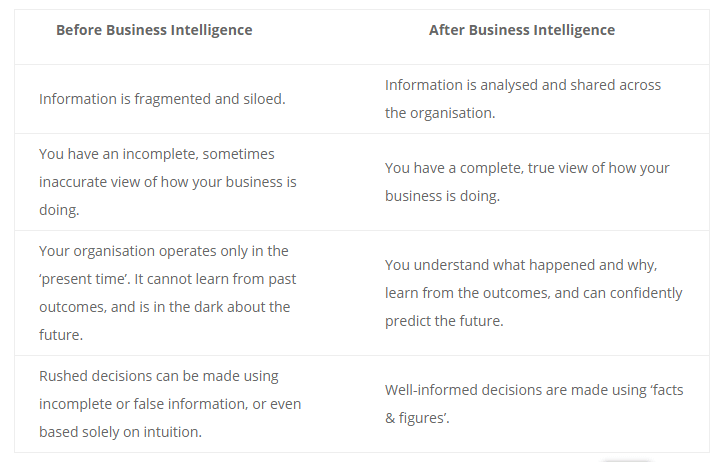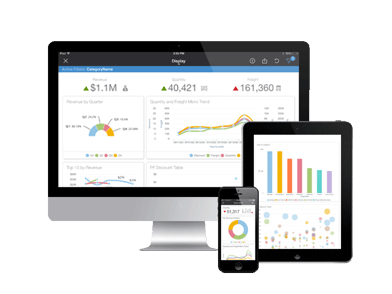Business Intelligence solutions help you make sense of your data and turn it into actionable insights, which drastically change how your organisation operates and makes decisions.

So, if you only know a little about BI, this site will provide a comprehensive view of BI, from definitions to usage, benefits, and some practical BI applications.
Do you know that the first Business Intelligence machine was actually created more than 65 years ago in a British tea shop? Surprising, isn’t it? This machine, with the name of Lyons Electronic Office (LEO), it was powered by 6,000 vacuum tubes, and its owner said it “turned data into actionable information” (you can read more about its history here).
Simpy put, BI is the information-providing method in the customised styles (on-premises or in the Cloud), a comprehensive data solution that transforms an organisation's existing data into business insights. Together with the rising demand for business insights, enterprises are gradually realising the importance of the BI strategies and tempting to build the best-in-class-framework for them.
In the Industry 4.0 revolution, where almost everything involves modern technologies, BI plays an essential assistant in the following tasks:
However, apart from the considerable help that BI provides, there are still some challenges that organisations need to pay close attention to when adopting BI solutions, such as implementation, cybersecurity, lack of specialists, or shrinkage in the job markets.
BI is an advantage only if fully understood. If you are a manager, and you think that your organisation needs BI solutions, our advice is that you take a look at the CEO’s guide to BI and some of the latest BI trends to have a clearer vision of what BI is about. Even when your business has already adopted BI, it is better if you check it regularly and try different ways to enhance your BI system to make sure you get the most return on your investment.
We can say that the core of BI is data. In order to improve data literacy, many companies seek specialists like data scientists or data engineers to take charge of the BI system. Some even go one step further and appoint a Chief Data Officer (CDO).
BI without data is like a tree without its root. It starts with the raw data lake - where information of all kinds is stored; then data warehouse - where data sometimes have to go through the ETL process before being added.
BI is one of the most effective data collection methods. Additionally, BI has the capability of making the collected data meaningful and actionable. For this reason, turning Data into Smart Data is one of the highlights that businesses can benefit from BI. Besides, BI provides advantages regarding Big Data, which is extremely valuable to businesses, especially in the Manufacturing industry.
Many people tend to get mixed up between BI and Data Analytics. The relationship and the differences between Data Analytics and BI can be explained more clearly here, but in a nutshell, ‘Data Analytics’ is one of the main components of BI solutions.
If you want to dig deeper into how Data Analytics changes the business, you can have a look at a few instances, like in the Hotel and Real Estate industries. Moreover, some trustful Analytics and BI vendors on the lists of many managers in 2018 are Microsoft and Tableau, as well as the “rising star” Birst (recently acquired by Infor).
The next level of “Data Analytics” in BI is “Networked Analytics”, which is the technology behind cloud-based BI solutions believed to help businesses manipulate data much better.
Artificial Intelligence (AI) is gradually evolving into the most efficient driver in BI. Thanks to AI, enterprises can gain real-time insights into consumer behaviour to identify trends and make decisions through sophisticated algorithms. Many tasks in the sales process can now be carried out by AI, and the making of AI is getting so high-tech that it’s even harder for the customers to determine if they are interacting with a human being or an AI.
Not only the world’s biggest tech giants, like Google, Apple and Microsoft, are putting their best in the AI race to maintain their competitive advantages, other IT enterprises also recognise the potential and benefits that AI brings and gradually join in one by one.
The manufacturing industry is facing the risk of a volatile and fragmented business environment that “change-or-die” is somehow the only option. From there, BI becomes a smart way to change, especially with all the help in Financial management, Inventory control, Supply chain management, and Cost management.
Tesla Motors has been applying Data Analytics product from Tableau for their manufacturing activities, and they have great support to achieve the aggressive goal of making 1 million cars by 2020, according to their CEO Elon Musk. You can read about this case study here.
Another industry in which BI can shine and lead the way is the hospitality industry. For a long time, hotel reports have been presented as on-screen reports, printouts or in PDF format, along with many other problems. The main difference between standard hotel reporting and BI is the ability to interact with the data – to perform a multi-dimensional analysis.
When it comes to Big Data, BI plays a significant part in assisting hotels and restaurants in handling it. Through the OLAP technology, an enormous amount of data can be processed to give the most relevant and actionable insights.
Retail is one of the business fields that needs BI the most for the non-stop coming demands for meaningful data. Every stage in a retail process now sees a substantial involvement of Analytics and BI. For example, here are two case studies about how Grab refines new products and how Financial Shared Services Centre benefits from Data Analytics.
Retailers are shifting from multi-channel to Omnichannel. This Omnichannel style can give the organisation a head-start against the competitors, but it also requires BI. You can click these links to know how Amazon Go re-shapes the Omnichannel Retail Experience with BI and Machine Learning from AI.
Infor is an enterprise software provider and strategic technology partner, serving more than 90,000 organisations worldwide. Infor’s software is purpose-built for specific industries, and BI products are one of the best solutions Infor offers to their customers.
Infor d/EPM Hospitality is designed with advanced functionality to help implement and facilitate analysis. This product has Office Plus which integrates directly with Microsoft Excel. Some famous clients that have used this solution are Wyndham Hotel Group, Kempinski Hotels, Auberge Resorts, Intrawest Resorts and Hard Rock International. Infor Coleman, which represents Infor’s belief in AI, is believed to transform every aspect of the business.
Acquired by Infor in 2017, Birst’s unique Cloud BI tools meet the needs of both IT and business users. They offer analytic solutions for every data scenario in the enterprise, support all types of business analytics initiatives.
TRG International offers Business Intelligence & Analytics solutions that capable of empowering your business to turn data into a profit-making asset.
Our solutions come fully equipped with lightning fast data visualisation, self-service dashboards, advanced analytics, powerful reporting, security, mobility and scalability – such capabilities are now at the fingertips of everyone in your organisation.

With Birst, we’re increasing efficiencies, decreasing costs, making better decisions, and improving employee productivity. We expect to save more than 100 hours per month in time spent generating reports now that we have access to a single, centralized source of information.

Matt Volk Build.com
The reason we decide to go with Birst is because it's an enterprise solution that could meet all of our core analytic needs... Looking at Birst's road map, it closely aligns with the vision and strategy we've put together for data analytic at CheapCarribean that just felt like a perfect match.

Jason Seiple CheapCaribbean
IT, Talent and F&B - we think it's a great combination.
We've thrived since 1994 resulting in lots of experience to share, we are beyond a companion, to more than 1,000 clients in 80+ countries.

© 2023 TRG International. Privacy Policy / Тerms & Conditions / Site map / Contact Us
TRG encourages websites and blogs to link to its web pages. Articles may be republished without alteration with the attribution statement "This article was first published by TRG International (www.trginternational.com)" and a clickable link back to the website.
We are changing support for TLS 1.0 and older browsers. Please check our list of supported browsers.